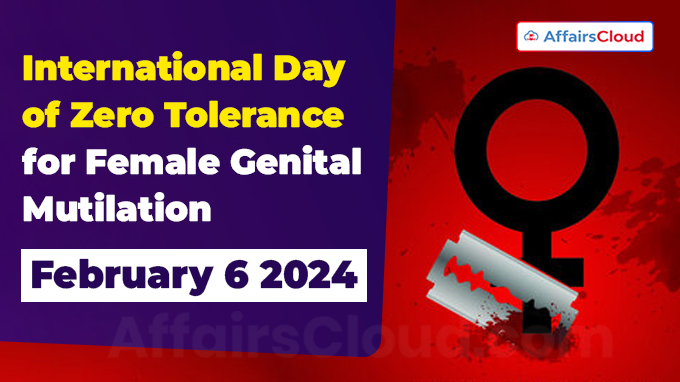 The United Nations (UN) International Day of Zero Tolerance for Female Genital Mutilation(FGM) is annually observed across the globe on 6 February to amplify and direct the efforts on the elimination of the practice of Female Genital Mutilation (FGM).
The United Nations (UN) International Day of Zero Tolerance for Female Genital Mutilation(FGM) is annually observed across the globe on 6 February to amplify and direct the efforts on the elimination of the practice of Female Genital Mutilation (FGM).
- The Day provides an opportunity for all stakeholders involved in ending FGM to celebrate achievements, advocate for the abandonment of the practice, and raise awareness.
6 February 2024 marks the 13th observance of UN recognised International Day of Zero Tolerance for FGM.
- The theme of International Day of Zero Tolerance for FGM 2024 is, “Her Voice. Her Future. Investing in Survivor-Led Movements to End Female Genital Mutilation.”
Background:
i.On 6 February 2003, Stella Obasanjo, the 1st Lady of Nigeria, and spokesperson for the Campaign Against FGM, made the official declaration on “Zero Tolerance for FGM” in Africa during a conference.
- The conference was organized by the Inter-African Committee on Traditional Practices Affecting the Health of Women and Children (IAC).
ii.The 1st International Day of Zero Tolerance for Female Genital Mutilation was observed on 6 February 2003.
iii.Subsequently, the 6th of February was adopted by the UN Sub-Commission on Human Rights as the International Day of Zero Tolerance to FGM.
iv.On 20 December 2012, the UN General Assembly (UNGA) adopted the resolution A/RES/67/146 and proclaimed the 6th February of every year as the International Day of Zero Tolerance for Female Genital Mutilation.
Global Joint Program on Eliminating FGM:
i.Since 2008, the United Nations Population Fund (UNFPA), jointly with the United Nations Children’s Fund (UNICEF), has led the largest global program to accelerate the elimination of FGM.
ii.The Joint Program currently focuses on 17 countries in Africa and the Middle East and supports regional and global initiatives.
iii.The Joint Program currently implementing Phase IV, focuses on:
- Reshaping social norms in affected communities and establishing national response systems in collaboration with governments.
iv.Phase IV, launched in 2022, will intensify efforts towards the elimination of FGM by 2030.
Female Genital Mutilation:
i.FGM refers to all procedures involving partial or total removal of the external female genitalia or other injury to the female genital organs for cultural or other non-medical reasons.
ii.FGM is mostly carried out on young girls between infancy and age 15 and has no health benefits, and it harms girls and women in many ways.
iii.It involves removing and damaging healthy and normal female genital tissue, and it interferes with the natural functions of girls’ and women’s bodies.
Points to Note:
i.In 2008, the World Health Assembly (WHA) passed a resolution (WHA61.16) on eliminating FGM, emphasizing the need for concerted action in all sectors.
ii.FGM is a universal issue primarily concentrated in 30 countries in Africa and the Middle East and is also practiced in some countries in Asia and Latin America.
iv.In 2024, some 4.4 million girls are at risk of suffering from this harmful act of gender-based violence. This equates to more than 12,000 cases every day.
- Without intensified efforts, this number will escalate to 4.6 million by 2030.
v.Addressing this critical issue requires an estimated USD 2.75 billion by 2030 in 31 priority countries.
Events:
On 6 February 2024, UNFPA and UNICEF (Global Joint Program on Eliminating FGM) organised a High-level event online to mark the International Day of Zero Tolerance for Female Genital Mutilation.
About United Nations Population Fund (UNFPA):
Executive Director– Dr. Natalia Kanem
Headquarters– New York, USA
It began operating in 1969 as the United Nations Fund for Population Activities.




